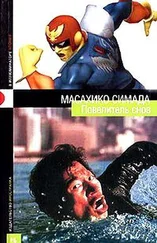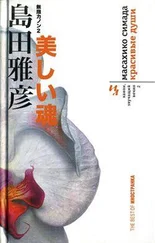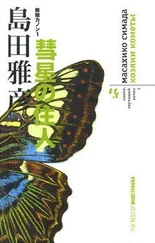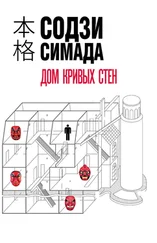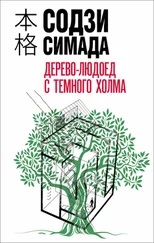The doctor let five others pass ahead of him before he went through the hand luggage check. But then he was taken aside while his bag was inspected, and had to explain the presence of the syringes, medicine, and clinical examination equipment. In the end his bag was handed to one of the stewardesses to carry on board. The reputation of doctors must have taken a dive in recent times.
Kita wandered about the shops, but didn’t buy anything. Then he went in a snack bar and ordered a curry rice. Watching at a distance, the doctor tutted at the sight of Kita standing there at the counter hunched over his food. If his planned suicide was pointless, eating curry was even more horribly pointless. No man about to die should be eating curry, and no man eating curry should be set on suicide. The doctor felt he was spying on some illicit scene. For some reason, he was suddenly consumed with anger. Nevertheless, he continued to stare until Kita had run his spoon around the edge of the plate and licked up the last morsel, like some starving student. The fellow was still brimming with life, it seemed. Perhaps there was one more thing he was planning to do. Still, this kind of energy wasn’t necessarily just self-sustaining. It could easily shift to something destructive – of himself, or of others as well.
The doctor boarded ahead of Kita and settled down to doze as soon as he was seated. But his nerves were still tingling from all the running around of the last couple of days, and he was in no fit state to sleep. Before long, a recording of the three o’clock news began on the screen in front of him. The newscaster announced that at two that afternoon Shinobu Yoimachi had been found alive and well in a Shibuya department store. Her abductor was still on the run, and the police were on his trail. Shinobu was refusing to give any information about him, either his name or distinguishing features. In an interview with the press, she had said, “The man who kidnapped me is not a bad person. I want to save him. He’s taken our illness upon himself.”
What would the viewers make of this? Not knowing what had actually happened, and seeing her looking as fervent as her words, at best they’d probably assume she’d fallen in love with her kidnapper, or even that the whole story had been a fiction. But perhaps there’d be a tendency to try to see some logic in what she said after all. It was true, the kidnapper wasn’t a bad person. That in itself would probably elicit some public sympathy. Personally, the doctor was unmoved by Kita’s apparent goodness, but somehow he felt a tremendous pity for him nevertheless. He was surely wasting his time by shadowing Kita all the way to Hokkaido like this, but he had an urge to meddle in his fate.
Once the plane was airborne, the doctor suddenly recalled someone who somehow reminded him of Kita. He’d forgotten the guy’s name, but he’d known him at middle school. They’d been in the same class in the second grade for a mere three months. Rumour had it that the boy had lost his parents in an accident, and his grandparents were taking care of him. He had a hook-shaped scar on his head, and in class he was constantly either snivelling like something coming to the boil, or chuckling to himself. In the first week everyone avoided him and kept their distance. In the second week, someone came up with the nickname “Frankenstein,” and from that moment on he’d been tormented. He was the perfect target for the violence of his fellow students. He made no effort to resist, so even people who were physically weaker felt safe to hurl the name at him. He also had a habit that the others couldn’t understand. As he lay there snivelling while he was beaten and kicked, he would murmur to himself, a little smile on his face. You could never really catch what he was saying. When a bully asked him to say it again, he’d simply turn away with a little chuckle. This would incense the bully, of course. He’d register a momentary unease at not knowing what his victim was thinking, and he’d have to inflict a bit more pain on Frankenstein to dispel it.
The doctor had wanted to stay out of the gang who made this boy a scapegoat, but one day he began to feel he’d like to see the guy dead. The boy was silent in class, but all the time he spent alone seemed to have induced him to think things through and develop his own philosophy, which he seemed to long to share with someone. On the way home from school one day, the boy stopped him and told him something like, “The world’s forsaken me. But what this means is that I’ve been chosen by God. I must battle alone against the world. I’ll probably be defeated. In order to win, I must become the incarnation of the world’s evils. When I do this, the world will find it needs me.”
The doctor had forgotten his name, but he clearly remembered these words. It could just be that the guy had been a genius – there are countless unlucky geniuses like that in the world. But hearing these words back then by the bridge in middle school, the doctor had been just one more of those with common sense who side with the world.
About a month after he’d begun to wish this incomprehensible possible genius dead, the guy was transferred to another school. If he was still alive today, what would he be doing? There was no way to know whether he’d died or possibly even been killed in his teens. This was why the boy haunted him. Even all these years later, that face would pop into his head several times a year, and always it would leave him brooding over whether he should have just killed him back then, or become his friend, or whether he should employ a detective and search him out, or whether the fellow still hated him. He even dreamed sometimes that the guy could now be a doctor with a side job in killing. Every time he recalled him in the past twenty years or so, the doctor thought to himself now, he’d talked himself into believing he had nothing in common with the guy.
But now that he’d come across the peculiar make-up of this fellow Yoshio Kita, it struck the doctor that the middle-aged Frankenstein would undoubtedly decide to condemn himself to death, just like Kita. The point is, the doctor tried telling himself, these folk who wage a losing battle with the world set up some grand suicidal scheme really for the sake of their own little egos. Nevertheless, he still felt disturbed.
His brain was spinning along at terrific speed, but his tired eyes and body couldn’t keep up, and he felt oppressed by dizziness. The doctor closed his eyes and attempted to simply wait quietly for the plane to land. It was smoothly losing momentum now, but his dizziness made it feel as if it was going into a tail spin. He felt ill. It was always at such moments that images of bloody human organs came floating past under his closed lids. If only the damn plane would just go down, he thought, bury its nose in the middle of some hapless town below and burst into flames – anything rather than this.
Kita disembarked ahead of him. The doctor retrieved his bag from the stewardess and stepped briskly after him. He gained ground on the departing backpack, thinking that he could safely hail Kita now without risking him running off. Just then Kita turned suddenly right and ran into the toilet. The doctor was obliged to follow him, and he placed himself at the next urinal. Even this failed to alert Kita, however.
“I’d ask you not to go eating curry at airports,” the doctor said.
Kita turned to look at him with an expression of distaste, and heaved a deep sigh. “God, how unlucky can I get!”
In a few more hours, Friday would begin. Why should a guy who was due to die tomorrow have any need for luck?
“No need to worry. I’m not planning to get in your way.” The doctor smiled at him in friendly fashion, but Kita frowned.
“So what the hell’re you up to then?” he demanded fiercely, and turned to wash his hands.
Читать дальше


